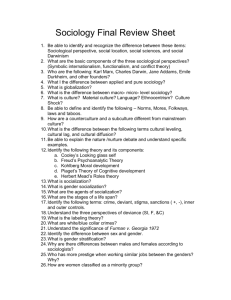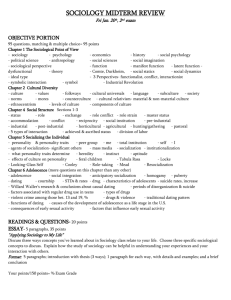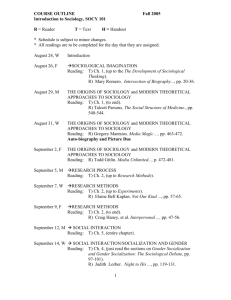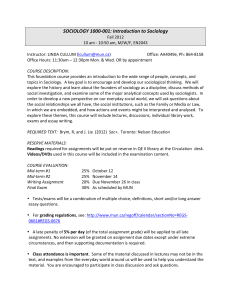Sociology
advertisement
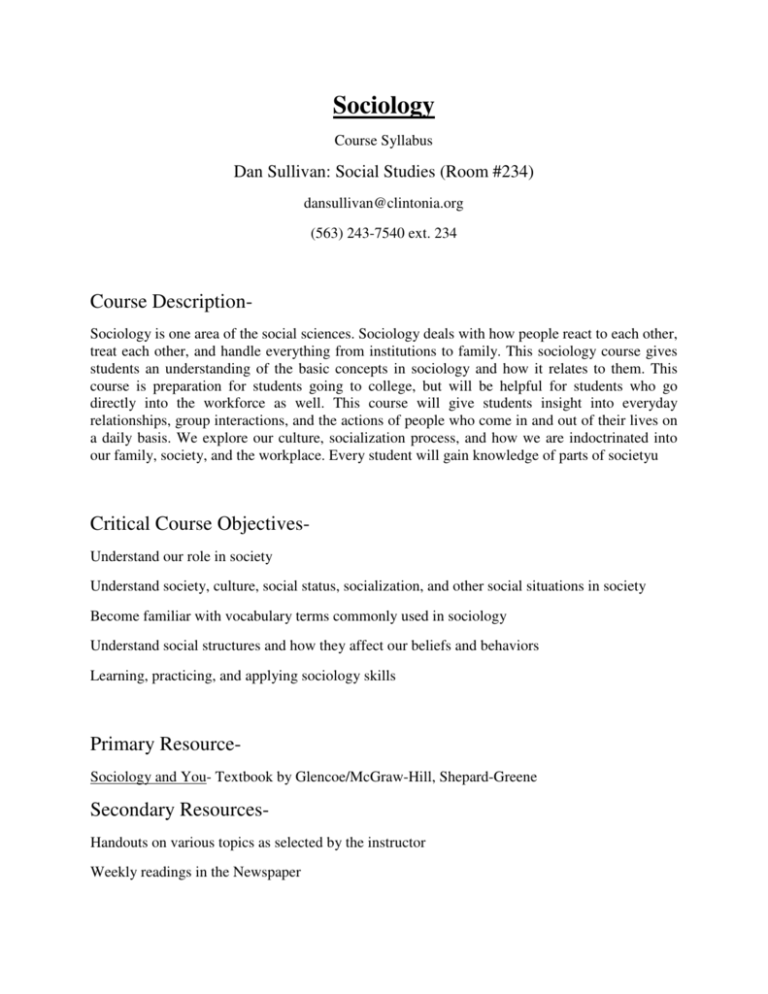
Sociology Course Syllabus Dan Sullivan: Social Studies (Room #234) dansullivan@clintonia.org (563) 243-7540 ext. 234 Course DescriptionSociology is one area of the social sciences. Sociology deals with how people react to each other, treat each other, and handle everything from institutions to family. This sociology course gives students an understanding of the basic concepts in sociology and how it relates to them. This course is preparation for students going to college, but will be helpful for students who go directly into the workforce as well. This course will give students insight into everyday relationships, group interactions, and the actions of people who come in and out of their lives on a daily basis. We explore our culture, socialization process, and how we are indoctrinated into our family, society, and the workplace. Every student will gain knowledge of parts of societyu Critical Course ObjectivesUnderstand our role in society Understand society, culture, social status, socialization, and other social situations in society Become familiar with vocabulary terms commonly used in sociology Understand social structures and how they affect our beliefs and behaviors Learning, practicing, and applying sociology skills Primary ResourceSociology and You- Textbook by Glencoe/McGraw-Hill, Shepard-Greene Secondary ResourcesHandouts on various topics as selected by the instructor Weekly readings in the Newspaper Reading ExpectationsChapter reading is required so the student understands the various aspects and uses of sociology vocabulary and theories. Reading will also help the student understand the context in which words and theories are used. Text reading is to be done outside of class. Handout and Newspaper reading will be done in and out of class. Some reading will be required so discussion can take place in class. The readings both in and out of class enhance the information taught throughout the chapter. ExpectationsEach student is expected to attend class on time and on a regular basis. They must demonstrate their work appropriately and on time. They should bring their book, a pencil, and a notebook each day. Students are expected to read the chapter outside of class to prepare for the test and to help with comprehension of material. Students are expected to respect others in class and their opinions. Late work will be accepted, but will lose up to 20% of value from work turned in on time. Class participation is an important part of the class so discussion can solidify and clarify your opinions on a topic. Units of StudyIntroduction- 1 week Sociological Perspectives- 2 week Sociological Methods- 1 week Culture- 2 weeks Social Structure- 2 weeks Socialization- 2 weeks Deviance, Crime, and Social Control- 2 weeks Social Institutions- 1 week Gender and Age Inequality- 1 week Social Change- 1 week Course EvaluationThere will be one research paper, six chapter test, one project, and a final test. The course evaluation is divided into three main classifications: Daily work, tests and quizzes, and projects. Coursework is assessed with total points. Students are expected to complete specific assignments within each unit of study and points will be awarded accordingly. We will use the standard Clinton Schools grading scale; Grading Scale A 93-100% (4.0) C+ 77-79% (2.33) A- 90-92% (3.67) C 73-76% (2.0) B+ 87-89% (3.33) C- 70-72% (1.67) B 83-86% (3.0) D+ 67-69% (1.33) B- 80-82% (2.67) D 63-66% (1.0) D- 60-62% (0.67) F 59% and below (0)






